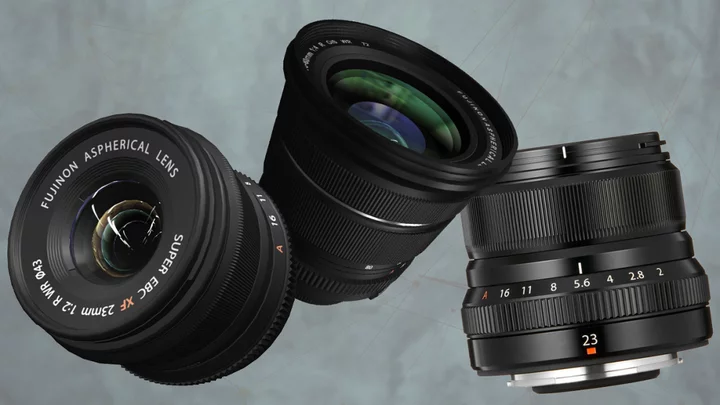Fujifilm is one of the first names of photography, with a history that stretches back nearly a century. Photographers who are old enough to have used analog cameras best know the brand's film stocks—it served as Kodak's biggest rival before the digital revolution, gaining traction by selling good film for fewer dollars.
In the digital era, Fujifilm has transitioned into a more upmarket brand. It established its place with the X100, a fixed lens compact with a hybrid viewfinder and SLR-sized sensor—absolutely innovative features a decade ago—introducing a design philosophy with a strong emphasis on classic aesthetics and manual handling.
The Fuji X System
The same concept carries over to the X system, a camera line with style and handling inspired by the X100, but with swappable glass. It launched in early 2012 with the X-Pro1 and a handful of prime lenses.
Fujifilm X-T4 with XF 16-80mm (Credit: Jim Fisher)Since then, the company has built out the system aggressively. There aren't any entry-level models available at press time—our favorite X-T200 is discontinued and hasn't been replaced. You need to budget around $900 to get started with the X-E4 or X-T30 II because they are the most affordable Fuji X cameras at the moment.
On the high end, the stacked X-H2S is Fujifilm’s current flagship, though you should also consider the excellent X-S20 or X-T5. Alternatively, you can turn to the X-Pro3, one of the few mirrorless cameras with an optical viewfinder.
All X system cameras sport the same sensor size, the APS-C format. The sensor format is smaller than full-frame alternatives, but lends itself to generally smaller, lighter lenses, and is a boon for action photographers who strive to get a bit more effective reach without having to grab an extreme telephoto lens.
Which Fuji X Lens Is Right for Me?
If you're used to thinking about focal lengths in full-frame terms, you just need to do a bit of quick math to understand equivalencies. Multiplying by 1.5 times gets you there—a 16mm lens on a Fuji X camera nets the same angle of view as a 24mm on a full-frame system. It's important to consider the angle of view when shopping for a lens—a smaller millimeter makes for a wider view, while bigger numbers indicate telephoto lenses.
Fujifilm X-Pro3 with XF 23mm (Credit: Zlata Ivleva)Most models sport an X-Trans sensor, a type that filters color with a more complex filter array than rivals. Fujifilm couples it with an excellent image processing engine. With these cameras, you have the flexibility to make images that range in look from modern digital to vintage film, without having to spend time in Photoshop.
As you move beyond entry level, you can enjoy one of the best autofocus systems in any camera family, along with features like in-body image stabilization (IBIS) and weather protection. If you own a body without IBIS, look for lenses with an OIS designation—that tells you that a lens includes optical image stabilization.
Likewise, not all of the company's lenses are protected from dust and splashes. If you buy a Fujifilm camera with weather protection, make sure to reach for a lens with the "WR" designation to ensure that it's as well protected as your camera body.
The GFX100 is a medium format camera that works with Fujinon GF lenses, but it isn't compatible with the XF and XC lenses used by the X system (Credit: Jim Fisher)For the most part, you should stick with Fujifilm Fujinon lenses for your camera. Make sure to shop for ones billed as XF or XC. Fujifilm also sells GF lenses for its medium format mirrorless system, but glass made for the 100MP GFX100 won't work with an X series camera.
Third-party support for the X mount is growing. Sigma has jumped in with its quartet of F1.4 Contemporary primes, and Tamron now offers several zooms for the Fujifilm system. Brands like Viltrox and Zeiss also market autofocus options, and you can get manual focus lenses from 7Artisans, Venus Laowa, and others to expand your creative options.

